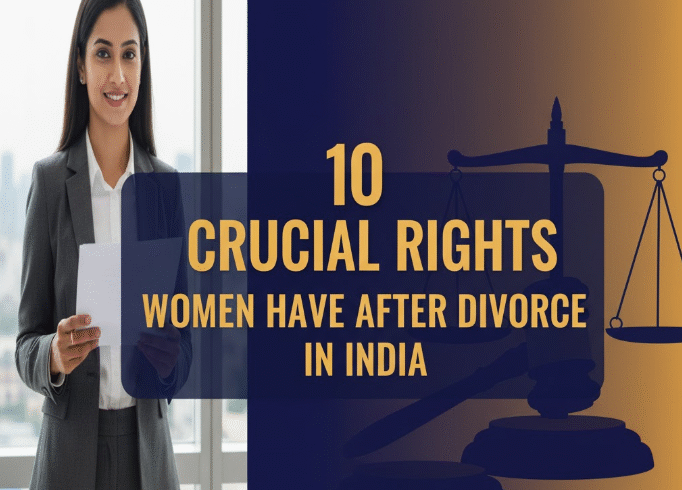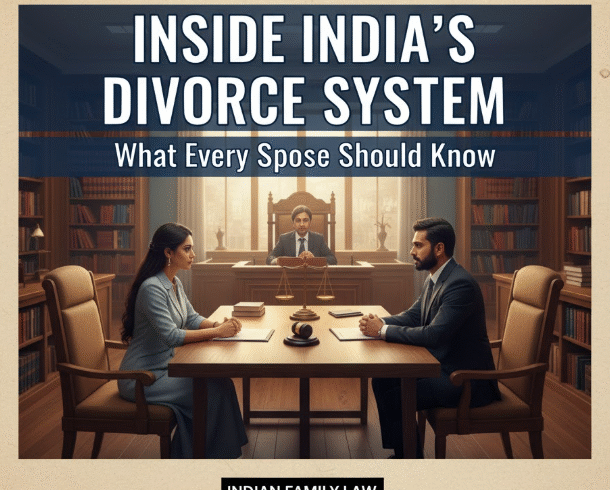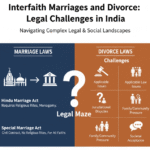Divorce and the Hindu Marriage Act
Marriage is meant to be a great journey yet sometimes it does not work out. If a Hindu couple in India wants to call their marriage a day, they have to go through some legal processes. The Hindu Marriage Act, 1955 is the law governing how divorce is done for Hindus in India. Here’s everything you need to know about divorce under this law, broken down in plain English.
What is the Hindu Marriage Act?
The Hindu Marriage Act was enacted in 1955. It’s a law that regulates marriage and divorce for people who follow the religions of Hinduism, Buddhism, Jainism or Sikhism. Traditions varied among communities, so the lack of a law led to confusion. This was an act that unified everyone and made things simple.
All Hindus, Buddhists, Jains or Sikhs by religion are covered under the law. It also extends to individuals who are neither Muslim, Christian, Parsi nor Jewish. So, unless you are a member of these religions, the Hindu Marriage Act likely applies to you.
For more legal resources and guidance, visit Zista Legalis.
Two Main Types of Divorce
Indian law offers two different routes when a couple wishes to dissolve their marriage. Consider these as two separate doors you can pass through to terminate a marriage.
If Both The Parties Agree for Divorce (Mutual Consent Divorces)
This is the quick and simple way. When both the husband and wife agree that they want to divorce, then they can do so by filing a petition for mutual consent divorce under Section 13B of Hindu Marriage Act.
How it works:
Both partners must live apart for a year before applying. They will need to file together a petition in court saying they cannot live as husband and wife anymore and that they have come to an agreement to end the marriage.
They will receive a cooling-off period of six months from the court. It’s a sort of waiting period to be sure they truly “want” the divorce. Over these six months, couples do a lot of thinking about their decision. Some change their minds and reconcile; others grow more certain that separation is the answer.
After six months (but before 18 months) pass from the date of filing of their initial petition, both must return to court in person to affirm their continued desire for the divorce. If both answer in the affirmative, then the court enters a divorce decree.
Timeline: Usually about 6-18 months from beginning to end.
Contested Divorce (When One Person Wants Out)
This is the messier route. In this scenario, one partner wants the divorce and the other doesn’t. The person who desires to be divorced is responsible for proving that the other spouse has done something wrong (caused one of the grounds) or that there’s a valid legal basis for a divorce.
This type of divorce can last a longer time: In addition to court hearings, there’s evidence-gathering and sometimes multiple turns in court. It can take anywhere from 2 to even 5 years, depending on the complexity of the case.
Valid Grounds for Divorce
You can’t just wake up and decide you’re divorcing your spouse with no cause. Certain grounds (reasons) for divorce must be specified by law. Here are the main ones:
Grounds for Both Husband and Wife
Section 13(1): Any marriage solemnized, whether before or after the commencement of this Act, may, on a petition presented by either the husband or the wife be dissolved by a decree of divorce on the ground that the other party:
| Ground | What It Means |
|---|---|
| Adultery | Has, after the solemnization of the marriage had voluntary sexual intercourse with any person other than his or her spouse |
| Cruelty | Physical/mental torture making it impossible to live together |
| Desertion | Abandoning you for at least 2 continuous years without reasonable cause |
| Conversion | Changing religion – no longer Hindu/Buddhist/Jain/Sikh |
| Mental Disorder | An illness making normal married life impossible |
| Leprosy | A severe incurable form |
| Venereal Disease | Causing serious disease like AIDS |
| Renunciation | Becoming a monk/Sanyasi |
| Presumption Of Death | Hasn’t been alive in seven years or more |
Exclusive Grounds for the Wife
The law accounts for the possibility of women being in a different situation. This gives women additional grounds to seek separation:
- Other Marriage Of Husband: In case your husband was already married to another woman before your marriage and if the first wife is alive at the time of your filing the petition, then you can seek divorce.
- Rape, Sodomy or Bestiality: If the husband has committed these crimes after marriage.
- No Maintenance: If you have a maintenance order and your husband has not been providing maintenance for one year.
- Child Marriage: If you were married under the age of 15, you can get a divorce before you turn 18.
These additional grounds indicate that the law attempts to safeguard women who may be in various positions of risk.
What Does Cruelty Really Mean?
Cruelty is the most common reason given for divorce, but a lot of people may not understand what exactly constitutes cruelty in terms of law.
Physical Cruelty
It is simpler to understand and prove. It includes:
- Beating or hitting
- Causing physical injuries
- Pushing, slapping or any other kind of violence
- Threatening with weapons
- Any effort to inflict physical pain
Mental Cruelty
This one’s more of a challenge since you can’t see it, but the same idea is true. Mental cruelty includes:
- Constant insults and humiliation
- False allegations concerning chastity or character
- Denying physical intimacy without reason
- Suspicious behavior and unfounded allegations
- Harassing for dowry
- Regular teasing around appearance, family or capabilities
- Ruining lives with words and deeds
- Not permitting you to see relatives
- Using family money to gamble or drink
Indian courts have held that mental peace is as important as physical security. When there is no physical violence, but your mental health is suffering from a spouse’s behavior, that very well might be grounds for divorce.
Learn more about family law matters at the Ministry of Law and Justice.
The Divorce Process: From Starting to Finish
Read on for what really happens when you file for divorce:
Step 1: Speak to a Lawyer
First meet with a family law lawyer who focuses on divorce litigation. They will hear what you have to say and let you know if you even have grounds for divorce.
Step 2: Filing the Petition
Your lawyer files the petition (a legal document) with the court clerk. This is filed in the family court of the county where you last lived with your spouse or where the marriage occurred.
Step 3: Serving Notice
The court serves your spouse notice of the fact that you have filed for divorce. Your spouse has time to file a response — generally about 30 days.
Step 4: Spouse’s Reply
Your spouse will have the option to consent or respond in opposition to your petition by filing a counter-petition and stating their claims.
Step 5: Evidence and Hearings
Both sides present evidence. This might include:
- Witness testimonies
- Papers (medical forms, police reports, messages, emails)
- Photos or videos
- Expert opinions
Step 6: Counseling
Many courts will send couples to counseling, in an effort to help them reconcile. In certain jurisdictions this is compulsory.
Step 7: Arguments and Final Hearing
Lawyers give closing arguments. The judge reviews everything carefully.
Step 8: Verdict
The judge announces the decision. Decree of Divorce: A decree signed by a judge if a divorce is granted, which formally ends the marriage.
Waiting Period
Even after the divorce decree, there’s typically a 90-day waiting period for appeals.
What Happens to Children?
When it comes to divorce, the couple is not the only one affected—children are deeply impacted, too. The law provides for the interest of the children.
Child Custody
Decisions are made based on the best interests of children, not their parents’ preferences. The welfare of the child is paramount.
For young children (3 to 5 years): Courts typically prefer awarding custody to the mother because they believe children of tender age require a mother’s care.
For older children: It can be more conditional/dependent upon the child’s overall well-being. (Like, if the child were old enough to voice an opinion and clearly stated a preference for one parent over another, courts could consider it in their best interest.)
Types of custody:
- Physical Custody: With whom the child will reside
- Legal Custody: Who decides important life details of the child
- Joint Custody: Both parents share responsibilities
- Sole Custody: All parental rights are awarded to one parent
Visitation Rights
The parent who is not given custody is usually granted the right to visit. This allows them to see and be with the child on certain days – weekends, holidays, or as the court may order.
Child Support/Maintenance
The noncustodial parent is required to pay for such costs as the child’s care, food, clothing, health and medical requirements and all other necessaries. The amount depends on:
- The paying parent’s income
- The child’s needs
- The type of life the child is used to
Alimony and Maintenance Explained
When a marriage is dissolved, one spouse (often but not always the wife) may have that requirement. This is known as alimony or maintenance.
Types of Maintenance
Temporary Maintenance: Money paid during a divorce case to help the spouse settle expenses while the case is pending.
Permanent Alimony: The divorced spouse receives one lump sum or monthly payments, after the finalization of the divorce.
Who Gets Alimony?
In the usual case, alimony goes to the lower wage-, or no income-spouse. With most legal agreements, wives get alimony from husbands, though the law is gender-neutral — and men can claim alimony if they are financially dependent.
How Much Alimony?
There is no set formula, but the courts weigh:
- Salaries and property of each spouse
- Standard of living during marriage
- Duration of marriage
- Ages and health of both parties
- Earning capacity and qualifications
- Contributions that are made to the marriage (which includes being a homemaker)
Courts can make awards of between 20-40% of the husband’s net monthly income as maintenance, however this is very much dependent on each case.
Can Alimony Be Stopped?
Yes, you can get your alimony stopped or modified if:
- The receiving spouse remarries
- The recipient spouse is self supporting
- The financial status of the paying spouse has become considerably worse
Property Division in Divorce
A common belief, as the myth goes, is that all things are divided 50-50 at divorce. Indian law doesn’t work that way.
The Hindu Marriage Act does not have any automatic property division rules. Instead:
Non-Marital Property: What you own prior to marriage or was inherited will still belong to you.
Property held in Joint Names: The jointly purchased assets are divided according to their ownership share.
Stridhan: The complete property of women — gifts, ornaments and possessions received by her before or during marriage. No one’s got a right over stridhan.
Husband’s Property: The wife does not have a stake in the husband’s ancestral or self acquired property unless her name is also mentioned on the documents, just by virtue of divorce.
But courts may factor in property when awarding alimony.
For comprehensive legal support and advice, explore Zista Legalis.
Common Mistakes People Make
So many of these mistakes are cited by lawyers who have dealt with dozens, if not hundreds, of divorce cases:
- Concealing finances: This never ends well
- Social media posting: You can use your posts against yourself
- Weaponizing kids: This hurts children and doesn’t look good in court
- Filing false allegations: If you file falsified claims, you could face criminal charges
- Not showing up for court dates: This tends to weaken your case quite a bit
- Failing to preserve evidence: Preserve your messages, emails, medical records and documents
- Signing without reading: Always involve your lawyer before you sign anything
The Emotional Side of Divorce
Although I’ll focus on the legal factors in this piece, it’s impossible to ignore the emotional ride. Divorce is hard on the couple and their children, but also it puts a dent in extended families.
Get help: Turn to counselors, therapists, or support networks. Maintaining mental health is important during this time.
Concentrate on healing: Allow yourself to grieve the relationship and get emotionally healthy again.
Co-parenting counts: If you have got kids, make the effort work together with your ex-partner for their sake. Children should not reap the suffering of parents who could not find a way to make it work.
New beginnings: Divorce is not the end of life, it’s a new beginning. We can be happy and find peace after our divorce.
Recent Changes and Current Trends
Divorce laws interpretation keeps developing with the times:
Irretrievable Breakdown of Marriage: Although not a ground in the Hindu Marriage Act, the Supreme Court has occasionally awarded divorces on the basis of irretrievable breakdown—when it is clear that a marriage cannot be saved (without specific grounds).
Speedier procedures: Some states have established fast-track family courts to expedite divorce cases.
Digital evidence: Courts are now admitting WhatsApp messages, emails and social media posts as evidence.
Live-in relationships: Courts have also begun acknowledging the rights of partners in live-in relationships, and some marriage laws apply to such couples as well.

Frequently Asked Questions
Q1: Do I need my spouse’s permission for a divorce?
No, you are able to file for contested divorce on genuine grounds even when your spouse does not concur. But going that way is more time consuming, and you will need to be able to prove your case in court.
Q2: How much time does it take to get divorced in India?
Mutual consent divorce is 6-18 months. A contested divorce could last between 2-5 years (or longer depending on fact specific details of the case and how busy court dockets are).
Q3: How soon after a divorce can I remarry?
You have to wait a required 90 days from the time of divorce decree. This allows time for appeals. After 90 days, if there’s no appeal, you can remarry.
Q4: Will I have to give back the gifts received in marriage?
By and large, no. Gifts to you are yours to do with as you please. But family heirlooms or borrowed valuables of sentimental value may have to go back, depending on the situation.
Q5: Can my husband make me quit working when we are getting divorced?
No, you have the right to work and make money. In practice, courts are all about financial independence! Your husband cannot limit your work.
Q6: What if my husband/wife is overseas?
You would still be able to get divorced in India if the marriage was solemnized in India and if you had last resided together in India. The court will have your spouse abroad served, and you don’t need their presence to proceed.
Q7: Can grandparents receive custody of the children?
In rare cases, yes. If both parents are unfit or it is in the child’s best interest, a court can award custody to grandparents or other relatives.
Q8: What is the time limit to file for a divorce?
No, there’s no time limit. You are able to file for divorce at any stage of the marriage. But, for a few of the grounds like desertion, you will have to wait for the required time period (2 years).
Q9: Is there a way to stop a divorce once it has been filed?
Yes, in mutual consent divorce both parties have the right to withdraw the petition for divorce before the passing of the final decree. In a contested divorce, you can withdraw a petition at any time until judgment is entered.
Q10: Does the cruelty need to be proved by witnesses?
Not always. Your own testimony is evidence. Nonetheless, supporting evidence i.e. medical records, witnesses, messages or police complaints that support your case is strong evidence.
Final Thoughts
Divorce is never a walk in the park, but understanding your rights and how it works can help you take on this very challenging time with more peace of mind. There is a clearly laid out framework in the Hindu Marriage Act for breakdown of marriages which are beyond repair.
Remember these key points:
- There are mutual and contested forms of divorce
- Contested divorce must have valid grounds
- The good of the children is an issue that is the court’s primary consideration
- Alimony is case-specific
- It takes time, so you have got to be patient
- A lawyer can be your best resource for protecting your rights
Whether you are thinking about a divorce or you just want to know what your rights are, information is the key to making good decisions. Every case is different so there are no hard and fast rules—consult a lawyer.
Marriage is meant to promote joy and serenity. When it doesn’t, and when all attempts at reconciliation break down, the law offers a way to exit respectfully. Use it well, act with justice and work on a brighter future for yourself and your children.
Disclaimer: This article contains very general details about divorce under Hindu Marriage Act and it should not be treated as legal advice. Laws and their interpretations evolve. Please consult with a competent family law attorney in your jurisdiction for appropriate advice.





